- Latest articles
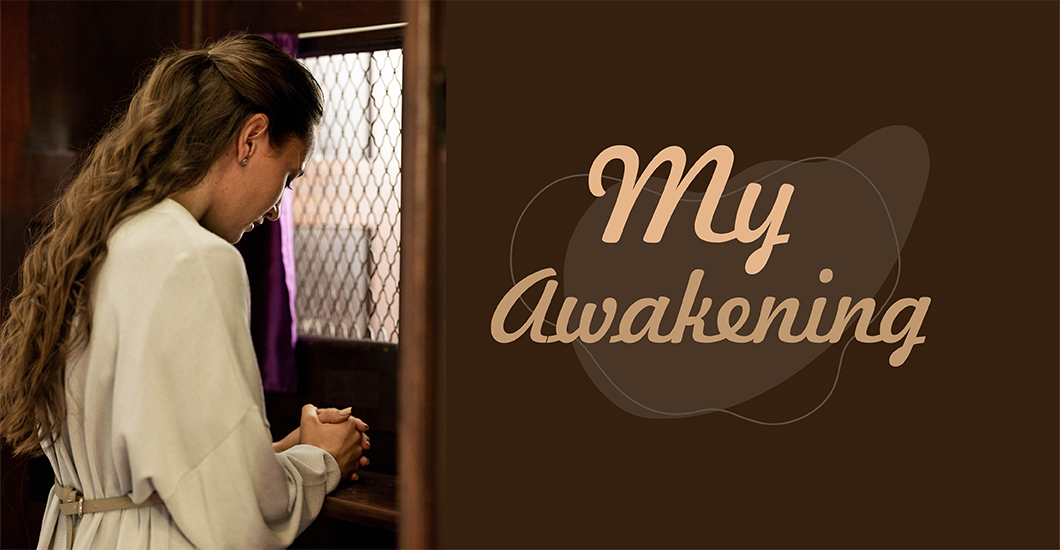
Can a thought become a sin? It’s time to reflect.
As long back as I can remember, I had been a good Christian, going to Church regularly and getting involved in Church activities, but nobody could guess that I was simply going through the motions. In 2010 however, an incident shook me to the core and led me to hear the voice of God amidst the anguish. This revelation helped me begin my journey to becoming a true Christian.
Unforgettable Night
Veronica and I were not the best of friends; we hung out together because our boys brought us together. But we were friends who genuinely liked each other and mothers who loved our children. She was sweet, beautiful, and a genuinely kind person. My son was her son’s best friend.
On August 28, 2010, Veronica called me and asked if my son could spend the night at her house. Though I had allowed him to, dozens of times before, that night, for some reason, I was uneasy. I told her no, but that he could go over and play for the afternoon and that I would pick him up before dinner. Around 4 o’clock, I drove over to her house to pick him up. As I stood in Veronica’s kitchen area and chatted about our boys, she told me how each of them had a gift and what special children they were. She had taken them to the grocery store to buy their favorite ice cream. My son also wanted cereal, which she generously bought for him and gave me to take home for him. I thanked her and drove away.
The next morning, I woke up to the news that she had been murdered. Right there, where I had stood talking to her the evening before…Her soon-to-be ex-husband had hired a hitman to murder her because they were separated, and really who knows why else. I felt like I’d been punched in the stomach. I couldn’t breathe. I couldn’t stop crying.
In my agony, I lay on my bedroom floor crying, wailing really. A beautiful young mother, 39 years old, murdered, leaving behind her 8-year-old son motherless. And for what? I cried out to God in anguish and anger. How could You let this happen? Why Lord?
In the midst of my anguish, a thought came over me. And for the first time in my life, I recognized this thought as the voice of God. God said, “I don’t want this; people choose this.” I asked God, “What, what in the world can I do in this awful place?” He answered me, “Susan, good in the world starts with you.” I began to think. I thought about how I had seen Veronica and her husband in church together, and I wondered how a person who was plotting murder could even attend church. God answered me again.
He told me that her husband did not start out as a murderer but that his sin had grown in his heart, gone unchecked, and he had been led down a long dark path. I remembered the Bible verse, “But I tell you that anyone who looks at a woman lustfully has already committed adultery with her in his heart” (Matthew 5:28). That moment, this verse made sense to me. I had always thought, “How can a thought be a sin?” After Veronica’s murder, it all made sense to me. Sin starts in your heart and takes over once you act on it with your hands. And if we never take the time to examine our conscience or think about what is right and what is wrong, chances are, we can really go down a wrong path.
Resounding Voice
So Lord, “What can I do?” He told me that the only person I could control was myself—that I could choose to love and spread that love outward. For me, this meant examining my own conscience and trying to become a better person. Did I love my enemy? Or even my neighbor, for that matter? The answer, unfortunately, was a resounding NO. I was dismayed when I realized I had not been loving towards the people around me.
In the Catholic Church, we have the Sacrament of Confession, where we go to a priest and confess our sins. I had always disliked this Sacrament and dreaded going for it. But here, in this place, crying on the ground, I found it to be a gift. A gift I was actually grateful for. In telling my sins, I was able to encounter Christ. I had a confession like I had never had before. In this Sacrament, I received the grace that Jesus offers to us when we choose to ask for it. I took a good hard look at myself, and my selfishness started to burn away because of my encounter with God’s unconditional love at the confessional. The Sacrament makes me try to do better, and though I know that I am a sinner and will continue to have failures, I can always look to receiving His sanctifying grace and forgiveness no matter what. This helps me to spread His goodness forward. I don’t think you have to be a Catholic to understand this.
Veronica’s murder was not my fault, but I would definitely not let her die in vain; I would not let her life be snuffed out without letting others know the impact it had on me and that good could come out of the ashes of such awful circumstances. Thus, my journey toward being truly Christian began.
I thought of Veronica in the Bible. While Jesus suffered during His Passion, making His way to Golgotha, bloodied and beaten, He came across a woman also named Veronica. Veronica wiped the face of Jesus. A small act of kindness. This man, this God-man, was bloodied, beaten, tired, and in agony, yet this woman, Veronica, provided a brief respite. A few seconds where the sweat and blood were wiped away, and for a moment, however short, he felt love from this woman. It did not stop His Passion nor His suffering, but in a world that was mocking Him, scourging Him, that woman’s touch with the cloth must have felt glorious. So, He imprinted His image on her cloth.
The name “Veronica” means “True Image.” Jesus left Veronica the mark of His love. And so, because of my friend, Veronica, who also provided me with love and respite during a tough time in my life, I must spread love and kindness wherever I go. I cannot stop suffering, but I can offer that respite to those who are lost, poor, lonely, unwanted, or unloved. And so, for me, I will wipe the Face of Jesus for as long as His grace and mercy allow me to.
'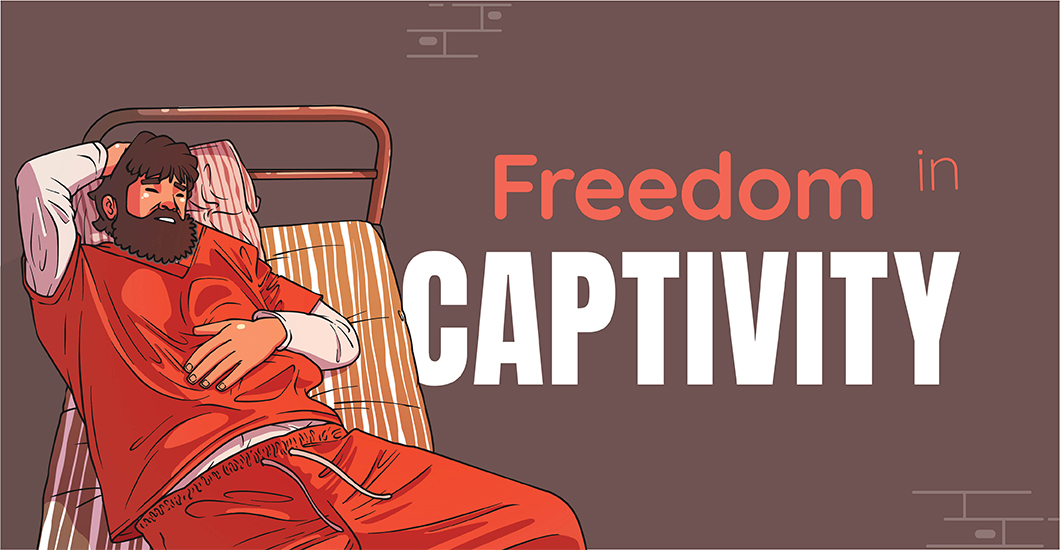
Blessings were abundant: friends, family, money, vacations—you name it, I had it all. So how did it all go so wrong?
I didn’t really have a wonderful storybook childhood—tell me someone who has—but I wouldn’t say it was terrible. There was always food on the table, clothes on my back, and a roof over my head, but we struggled. I don’t just mean we struggled financially, which we definitely did, but I mean we struggled to find our way as a family. My parents were divorced by the time I was six, and my father turned to heavier drinking than ever before. Meanwhile, my mother found men who were into the same drugs and habits as she was.
Though we had a rough start, it didn’t stay that way. Eventually, against all statistical odds, both of my parents and my now stepfather, by the grace of God, got sober and have stayed that way. Relationships were rebuilt, and the sun began to rise in our lives again.
A few years went by, and there came a point when I realized that I had to do something productive and different in my life so that I could avoid all of the pitfalls of my childhood. I buckled down and went back to school. I got my barber’s license and worked myself into a nice career. I made plenty of money and met the woman of my dreams. The opportunity eventually arose, and I started a second career in law enforcement in addition to cutting hair. Everyone liked me, I had friends in very high places, and it looked as if the sky was the limit.
So how’d I end up in prison?
Unbelievably True
Wait a minute, this isn’t my life…this can’t be real…HOW IS THIS HAPPENING TO ME?! You see, despite everything I had, I was missing something. The worst part of it was that I knew all along exactly what that something was, and I ignored it. It’s not like I didn’t ever try, but I just couldn’t give God my everything. Instead, I lost it all…or did I?
This is how it is: Whatever sin you’re holding onto will eventually work its roots deep down into the core of your soul and choke you out until you can’t breathe anymore. Even seemingly insignificant sins demand more of you, little by little, until your life is upside down, and you’re so disoriented that you don’t know which way is up.
That’s how it started for me. I began giving in to my lustful thoughts somewhere around middle school. By the time I was in college, I was a full-fledged womanizer. When I did finally meet the woman of my dreams, there was no way I could ever do what was right anymore. How could someone like me be faithful?
But that’s not all.
For a while, I tried to go to Mass and do all the right things. I went to confession regularly and joined clubs and committees, but I always kept just a little bit of my old sins for myself. It’s not necessarily that I wanted to, but I was so attached, and I was afraid to let go.
Time went on, and I slowly stopped going to Mass. My old sinful ways began to fester and creep back into the forefront of my life. Time moved fast, and pleasures swirled all around me as I threw caution to the wind. I was high on life. On top of it all, I was very successful and admired by many. Then it all came crashing down. I made some terrible choices that left me serving a 30-year prison sentence. More importantly, I left behind people who loved and cared for me with a lifetime of pain.
You see, sin has a way of convincing you to go further than you’ve gone and making you more depraved than you once were. Your moral compass becomes confused. Worse things seem more exciting, and the old sins don’t cut it anymore. Before you know it, you’ve become someone you don’t even recognize.
Fast forward to the present day…
I live in an 11×9 ft. cell, and I spend twenty-two hours a day locked inside of it. There is chaos all around me. This is not how I imagined my life would turn out.
But, I found God within these walls.
I have spent the last few years here in prison praying and seeking the help I needed. I have been studying Scripture and taking lots of classes. I’ve also been sharing the message of God’s mercy and peace with all the other inmates who will listen to me.
It took an extreme wake-up call before I finally surrendered to God, but now that I have, my life has been totally different. I wake up every morning thankful to be alive. I am grateful every day for the shower of blessings that I receive despite my incarceration. For the first time in my life, I experienced peace in my soul. It took me losing my physical liberty to find my spiritual freedom.
You don’t have to go to prison to find and accept God’s peace. He will meet you wherever you are, but let me warn you—if you hold anything back from Him, you may very well end up being my neighbor in prison.
If you recognize yourself in this story, please don’t wait to seek professional help and guidance, starting from, but not limited to, your local parish priest. There is no shame in admitting you have a problem, and there is no better time than NOW to get help.
If you’re in prison and you’re reading this, I want you to know that it’s not too late for you. God loves you. He can forgive whatever it is you’ve done. Jesus Christ shed His precious blood to forgive all of us who come to Him with our pain and our brokenness. You can start right now, this very moment, by recognizing that you are powerless without Him. Cry out to Him with the words of the tax collector: “O God, be merciful to me, a sinner” (Luke 18:13).
I leave you with this: “What profit would there be for one to gain the whole world and forfeit his life?” (Matthew. 16:26)
'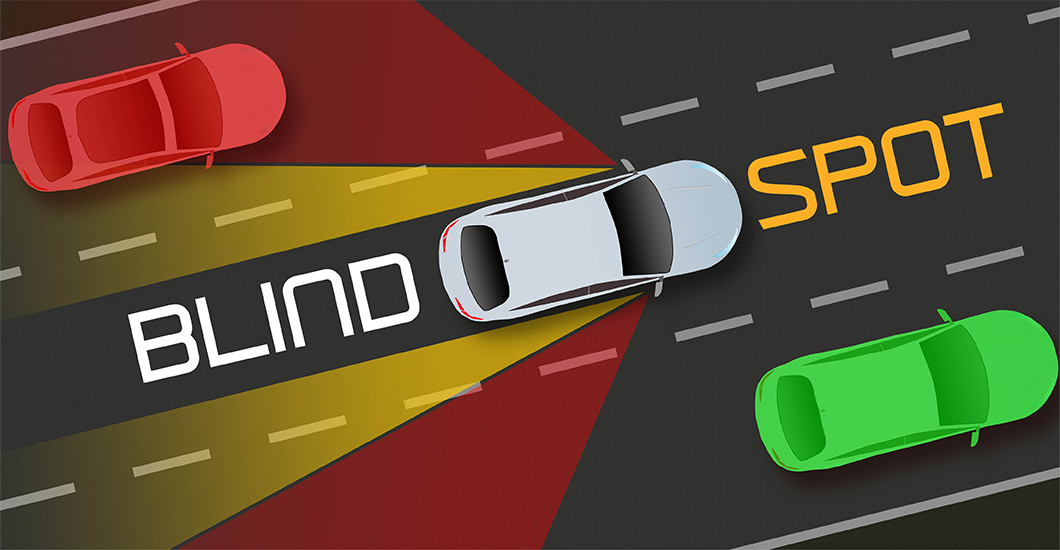
On life’s winding journey, it’s interesting to know that there are blind spots to look out for!
We know how important it is to check our car’s blind spots, especially before changing lanes, reversing, or turning. Unfortunately, we learn the hard way sometimes.
Lately, I’ve been struck with the notion that we all possess physical and spiritual blind spots. Jesus taught us to be wary of the latter when He said, “I have come into this world, so that the blind will see and those who see will become blind.” Some Pharisees who were with Him heard Him say this and asked, “What? Are we blind too?” Jesus said, “If you were blind, you would not be guilty of sin; but now that you claim you can see, your guilt remains” (John 9:39-41). What is Jesus telling us here?
We need to be very careful that we stay sitting at Jesus’ feet, heeding His instruction, learning from Him, and staying open to His corrections. As soon as we think we have ‘arrived’ or ‘have this Christian lifestyle down,’ we’re in dangerous territory. Our wisest thoughts, greatest sacrifices, and deepest loves are mere breaths compared to God’s infinite loving wisdom.
For we only see partially; we do not see the whole picture, the master plan. Only God does. Saint Paul puts it like this, “Now we see only a reflection as in a mirror, then we shall see face to face. Now I know in part; then I shall know fully, even as I am fully known” (1 Corinthians 13:12).
Learning the Hard Way
Looking back on my life, I recall that I was completely unaware of my pride, sins, shortcomings, judgments, presumptions, biases, fears, and lack of trust more times than one. Thankfully, God introduced people and events into my life, which helped uncover some of these areas of spiritual blindness.
I tend to learn the hard way. For years, I couldn’t quite put my finger on why one woman actively avoided me. It created a lot of tension, as we were in the same play-and-pray group. Eventually, I got the courage and humility to ask how I had offended her. The answer hurt like the dickens, and although we never became friends, at least now I am aware of one of my blind spots that were previously under the radar.
It takes a humble heart to allow people to remove splinters from our eyes. And our trouble is, we are not often humble enough.
There are many instances in my life when I was unaware of the harm that my unforgiveness, pride, need to control, tolerance for sin, or lack of gratitude caused. I do not wish to make a public confession here, but God has slowly been peeling off layers of spiritual blindness from me. Although it can be painful, I have gained greater spiritual freedom.
More to Learn Every Day
A wise friend once told me that she looks forward to Lent each year. I have never been one of those holy souls, so my ears perked up when she said that. She told me that she does not choose what she gives up or does for Lent. She lets her husband do that for her. I was absolutely floored by that concept.
What if we went to our spouse or a trusted fellow Christian and asked them how we could grow spiritually or what sinful habit we should confess?
So many times, our root sin is buried under more obvious issues. For instance, anger might be due to unforgiveness, worry might stem from the need to control, and perfectionism often involves pride. Most sins stem from a lack of trust in God’s goodness.
The Power of Direction
There is a real power that comes with being able to name your root sin. If you can identify it, you can repent and be free of it. However, root sins are tricky; they like to stay buried. A good regular confessor or spiritual director is a huge help. “Oh, if only I had had a spiritual director from the beginning, then I would not have wasted so many of God’s graces,” wrote Saint Faustina.
We can seek out accountability partners. God often uses other people to help us ‘see’ ourselves better. Family members, especially those who are actively following Christ, can be great blind spot checkers, as they see us at our best and our worst. And let’s not forget to simply ask God to reveal our blind spots to us.
What if we prepared for confession by asking the Holy Spirit to reveal an area of sin that we are oblivious to or ignoring? What if we did the same at the end of each day?
I particularly recommend seeking the advice of wise Christians before making big decisions. Just as it’s more important to check blind spots when we are planning to set out or change direction in a vehicle, we need to be extra careful to do the same when we are discerning our vocations, career choices, and other major life decisions.
Heavenly Father, give us humble, listening hearts so that You can change us for the better. Grant us Your vision to grow in our love for You and for our neighbors.
'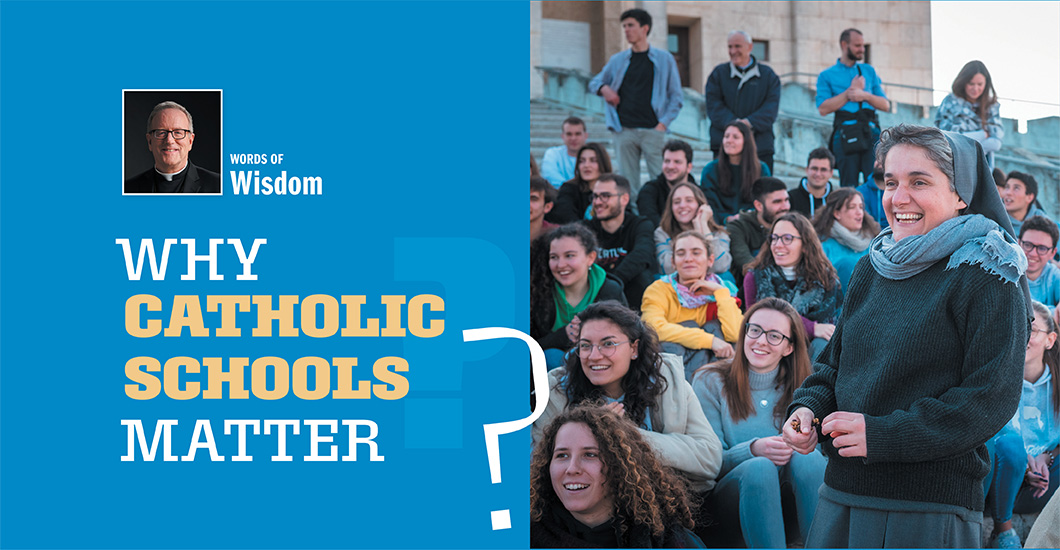
At the beginning of February, the Church in the United States celebrates Catholic Schools Week. I would like to take this opportunity to sing the praises of Catholic schools and to invite everyone—Catholic and non-Catholic alike—to support them. I attended Church-affiliated educational institutions from first grade through graduate school, from Holy Name Elementary School in Birmingham, Michigan, to the Institut Catholique in Paris. That years-long immersion massively shaped my character, my sense of values, my entire way of looking at the world. I am convinced that, especially now, when a secularist, materialist philosophy largely holds sway in our culture, the Catholic ethos needs to be inculcated.
Certainly, distinctive marks of the Catholic schools I attended were the opportunity for Mass and other sacraments, religion classes, the presence of priests and nuns (a bit more common in the early years of my formation), and the prevalence of Catholic symbols and images of saints. But what was perhaps most important was the manner in which those schools showed the integration of faith and reason.
To be sure, there is no “Catholic” mathematics, but there is indeed a Catholic way to teach math. In his famous parable of the cave, Plato showed that the first step away from a purely materialist vision of the world is mathematics. When someone grasps the truth of even the simplest equation, or the nature of a number, or a complex arithmetical formula, he has, in a very real sense, left the realm of passing things and has entered a universe of spiritual reality. The theologian David Tracy has remarked that the commonest experience of the invisible today is through the understanding of the pure abstractions of mathematics and geometry. Properly taught, mathematics, therefore, opens the door to the higher spiritual experiences offered by religion, to the invisible realm of God.
Similarly, there is no peculiarly “Catholic” physics or biology, but there is indeed a Catholic approach to those sciences. No scientist could ever get her work off the ground unless she believed in the radical intelligibility of the world—that is to say, the fact that every aspect of physical reality is marked by an understandable pattern. This is true of any astronomer, chemist, astrophysicist, psychologist, or geologist. But this leads rather naturally to the question: Where did these intelligible patterns come from? Why should the world be so marked by order, harmony, and rational patterning? There is a marvelous article composed by the twentieth-century physicist Eugene Wigner entitled “The Unreasonable Effectiveness of Mathematics in the Natural Sciences.” Wigner’s argument was that it cannot be mere chance that the most complex mathematics successfully describes the physical world. The answer of the great Catholic tradition is that this intelligibility comes, in fact, from a great creative intelligence that stands behind the world. People who practice the sciences, therefore, should have no problem believing that “in the beginning was the Word.”
There is no “Catholic” history either, though there is most certainly a Catholic way of looking at history. Typically, historians do not simply recount the events of the past. Rather, they look for certain overarching themes and trajectories within history. Most of us probably don’t even realize this because we came of age within a liberal democratic culture, but we rather naturally see the Enlightenment as the turning point of history, the time of the great revolutions in science and politics that defined the modern world. No one could doubt that the Enlightenment was a pivotal moment, but Catholics certainly don’t see it as the climax of history. Instead, we hold that the pivot point was on a squalid hill outside of Jerusalem around the year 30 AD, when a young rabbi was being tortured to death by the Romans. We interpret everything—politics, the arts, culture, etc.—from the standpoint of the sacrifice of the Son of God.
In his controversial Regensburg address from 2006, the late Pope Benedict argued that Christianity can enter into a vibrant conversation with the culture precisely because of the doctrine of the Incarnation. We Christians do not claim that Jesus was one interesting teacher among many, but rather the Logos, the mind or reason of God, made flesh. Accordingly, whatever is marked by logos or rationality is a natural cousin to Christianity. The sciences, philosophy, literature, history, psychology—all of it—find in the Christian faith, therefore, a natural dialogue (there is that word again!) partner. It is this basic idea, so dear to Papa Ratzinger, that informs Catholic schools at their best. And this is why the flourishing of those schools is important, not simply for the Church, but for our whole society.
'
Who is your favorite hero? Have you ever met a superhero in your life?
As a kid growing up in San Francisco in the ‘50s, we had our heroes, usually of the cowboy variety— paramount of whom was John Wayne, who could go where he wanted to go, had a code that he lived by, defeated the bad guys (or those whom the society at that time deemed to be ‘bad guys’), got the girl at the end, and rode off into the sunset. As the USA was moving from a victory over the Axis powers following WWII into the perils of the Cold War (nuclear war drills, the Cuban Missile Crisis, etc.), the heroic figure of John Wayne was appealing, as we longed for a time when our trails were indeed ‘happy.’
Meet the Real Hero
Fast forward to 2022, and the desire for heroes still persists. Just look at the superhero franchises that dominate mainstream movies. The Marvel movies and their ilk, which resemble more ‘theme park’ experiences than exploring the complexities of our human experience, offer us a seemingly endless supply of superheroes (not just ‘heroes’ but ‘superheroes’!) who defeat our enemies. When dealing with the ravages of the global pandemic, the war in Europe, nuclear saber-rattling, global warming, economic uncertainty, and violence on the streets of the United States, superheroes address our desire that great men and women can overcome the dangers that are thrust upon us.
At this juncture, a Christian may raise his hand and say, “Well, we have a hero that tops any and all ‘superheroes,’ and His name is Jesus.”
That raises the question, is Jesus a hero? I don’t think so, because a hero does something that the ordinary person can’t or won’t do, so, we vicariously watch them overcome enemies, which temporarily relieves us of our anxiety until it inevitably returns with the next crisis.
While Jesus is not a hero in the conventional sense, He definitely is a warrior of a unique kind: He is the Word of God who became human to save us from sin and death. He is going to battle with these arch-enemies, but He is not going to use weapons of aggression, violence, and destruction.
Rather, He will overcome them through mercy, forgiveness, and compassion, all brought to the fore through His Passion, Death, and Resurrection. Notice how He overcame sin and death. Beginning in the Garden of Gethsemane, He absorbed our sin—our dysfunction, disorder, inhumanity, self-absorption—and became sin. According to St. Paul: “For our sake He made Him to be sin who did not know sin, so that we might become righteousness of God in Him” (2 Corinthians 5:21). Though Jesus is not a sinner because He is divine—the second person of the Trinity—He took our sin and for a time ‘became sin,’ which killed Him. The harsh reality is that our sins killed Jesus, the Son of God.
But, the Christian story did not end on Good Friday because three days later, God the Father raised Jesus from the dead through the power of the Holy Spirit. In so doing, our arch-enemies—sin and death—were vanquished.
So, Jesus is definitely the supreme spiritual warrior, but He’s not a hero in the conventional sense. Why not?
Thread in Divine Tapestry
Jesus’ Passion, Death, and Resurrection are the key marks of the Paschal Mystery, the mystery of our Faith. Notice the ‘our.’
Jesus went through His suffering and dying —not to spare us from going through it— but to show us how to live and suffer so that we may experience resurrected life now and for eternity. You see, as baptized members of His mystical Body, the Church, we “move, live, and have our being” in Jesus (Acts 17:28).
To be sure, He wants us to believe in Him because, as we hear in John 14:6, “I am the way, the truth, and the life. No one comes to the Father except through me.” Building on that foundational belief, we’re called to be His disciples to carry out His Mission, which He gave to His Church at His Ascension (cf. Mark 16:19-20 and Matthew 28:16-20). More to it, we’re called to participate in His very Being. As Romano Guardini notes in his spiritual classic, The Lord, “we are like a thread in a divine tapestry: we realize our humanity in and through Him.” In other words, we do as Jesus modeled for us.
Participating in the Resurrected and Glorified Presence of Jesus through the Sacramental life of the Church, especially the Eucharist, we live the Paschal Mystery through the empowerment of the Holy Spirit. So, is Jesus a hero? Listen to what Peter said when Jesus asked him: “Who do people say that I am?” Peter’s reply: “You are the Messiah, the Son of the living God” (Matthew 16:17). Jesus is more than a hero; He is a warrior of a unique kind. He is the sole and universal SAVIOR!
'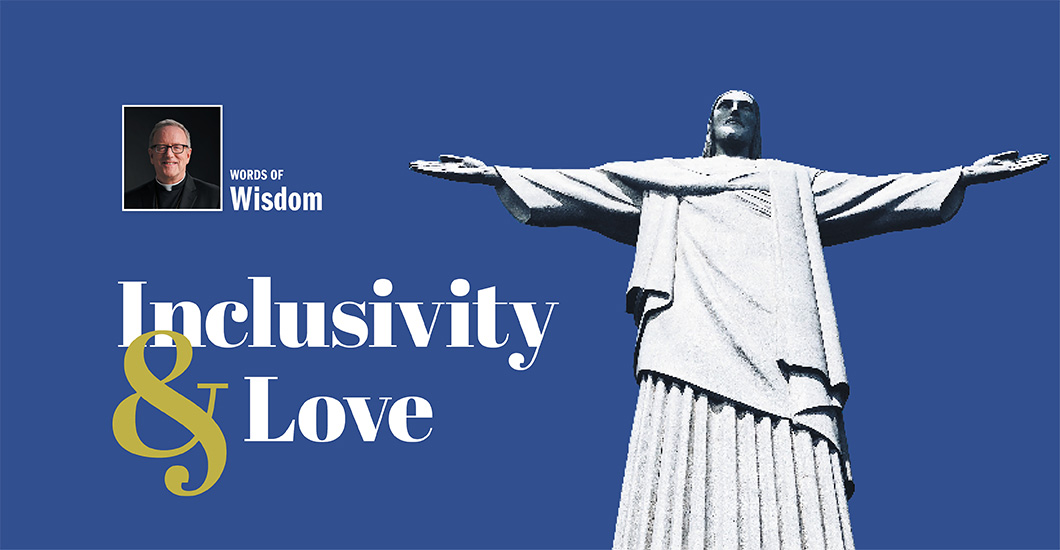
The other night, I had the privilege of participating in one of the listening sessions for the continental phase of the Synodal process. The basis for our discussion was a lengthy document produced by the Vatican after it had compiled data and testimony from all over the Catholic world. As I have been studying and speaking about synodality, I very much enjoyed the exchange of views. But I found myself increasingly uneasy with two words that feature prominently in the document, and that dominated much of our discussion— namely, “inclusivity” and “welcoming.”
Again and again, we hear that the Church must become a more inclusive and welcoming place for a variety of groups: women, LGBT+ people, the divorced and civilly remarried, etc. But I have yet to come across a precise definition of either term. What exactly would a welcoming and inclusive Church look like? Would it always reach out to everyone in a spirit of invitation? If so, the answer seems obviously to be yes. Would it always treat everyone, no matter their background, ethnicity, or sexuality, with respect and dignity? If so, again, the answer is yes. Would such a Church always listen with pastoral attention to the concerns of all? If so, affirmative. But would a Church exhibiting these qualities never pose a moral challenge to those who would seek entry? Would it ratify the behavior and lifestyle choices of anyone who presented him or herself for admission? Would it effectively abandon its own identity and structuring logic so as to accommodate any and all who come forward? I hope it is equally evident that the answer to all those questions is a resounding no. The ambiguity of the terms is a problem that could undermine much of the Synodal process.
In order to adjudicate this matter, I would suggest that we look not so much to the environing culture of the present day but to Christ Jesus. His attitude of radical welcome is nowhere on clearer display than in his open-table fellowship, that is to say, his consistent practice—countercultural in the extreme—to eat and drink not only with the righteous but
also with sinners, with Pharisees, tax collectors, and prostitutes. These meals of sacred fellowship Jesus even compared to the banquet of heaven. Throughout His public ministry, Jesus reached out to those considered unclean or wicked: the woman at the well, the man born blind, Zacchaeus, the woman caught in adultery, the thief crucified at his side, etc. So, there is no question that He was hospitable, gracious, and yes, welcoming to all.
By the same token, this inclusivity of the Lord was unambiguously and consistently accompanied by his summons to conversion. Indeed, the first word out of Jesus’ mouth in his inaugural address in the Gospel of Mark is not “Welcome!” but rather “Repent!” To the woman caught in adultery, He said, “Go and sin no more”; after meeting the Lord, Zacchaeus promised to change his sinful ways and compensate lavishly for his misdeeds; in the presence of Jesus, the good thief acknowledged his own guilt; and the risen Christ compelled the chief of the Apostles, who had three times denied Him, three times to affirm his love.
In a word, there is a remarkable balance in the pastoral outreach of Jesus between welcome and challenge, between outreach and a call to change. This is why I would characterize His approach not simply as “inclusive” or “welcoming” but rather as loving. Thomas Aquinas reminds us that to love is “to will the good of the other.” Accordingly, one who truly loves another reaches out in kindness, to be sure, but at the same time, he does not hesitate, when necessary, to correct, to warn, even to judge. My mentor, Francis
Cardinal George was once asked why he disliked the sentiment behind the song “All Are Welcome.” He responded that it overlooked the simple fact that, though all are indeed welcome in the Church, it is “on Christ’s terms, not their own.”
An overall concern that I have, very much related to the consistent use of the terms “welcoming” and “inclusivity,” is the trumping of doctrine, anthropology, and real theological argument by sentiment, or to put it a bit differently, the tendency to psychologize the matters under consideration. The Church doesn’t prohibit homosexual acts because it has an irrational fear of homosexuals, nor does it refuse communion to those in irregular marriage arrangements because it gets its kicks out of being exclusive; nor does it disallow women’s ordination because grumpy old men in power just can’t stand women. For each of these positions, it articulates arguments based on Scripture, philosophy, and the theological tradition, and each has been ratified by the authoritative teaching of bishops in communion with the pope. To throw all these settled teachings into question because they don’t correspond to the canons of our contemporary culture would be to place the Church into real crisis. And I sincerely do not believe that this shaking of the foundations is what Pope Francis had in mind when he called for a synod on synodality.
'
Many of us are familiar with the parable in the Gospel of Luke (Luke 18: 9-14) that dramatizes and contrasts the prayers of the Pharisee and the tax collector. When we compare their prayers, we might identify more with the prayer of the Pharisee who thanks God that he was not a sinner like the tax collector. Thinking ourselves generous, we may have prayed such a prayer without recognizing the self-righteous attitude and the sense of superiority embedded in that prayer. Jesus instead praises the humble prayer of the tax collector whose humility and honesty allows him to go home justified.
If we adopt the attitude of the tax collector, we won’t be likely to judge other people unjustly. If we sincerely see ourselves as the sinner we are, how could we pronounce the final judgment on another? Judging others’ final destiny comes from an attitude of superiority, a sense of pride that we might say was the first and greatest sin. Our Lord always leaves the door for mercy open until the final moment.
As we go through our day, do we stop to consider how many times we judge others based on exterior perceptions, whereas the Lord sees into their hearts? Do you ever find yourself condemning others when you are watching or reading the news? How often does a person’s race, religion, sexual orientation, or any other trait that is different from our own cause us to pass a negative judgment on them?
Unfortunately, many of us don’t realize the gravity of judging others while failing to closely examine our own actions and motivations. In the Gospels, Jesus embraces the outcasts and sinners. He shows love and acceptance toward those that the self-righteous Pharisees and the scribes rejected. The compassion Jesus had for sinners should fill our hearts-whenever we are dealing with those who are different from us or whose actions offend us.
When we humbly realize that we are indeed sinners, we will throw ourselves on God’s mercy and realize that the blood Jesus shed on Calvary was shed for us, for our enemies, and for those we are inclined to judge. They too have precious souls that Jesus longs to redeem.
When we pray for people, let’s first examine the attitude we have toward them. Is our attitude compassionate, or is it purely judgemental? A prayer that comes from a loving heart will be more fruitful than a prayer born of judgment.
Let us ask the Lord’s forgiveness for the times we have judged others unjustly and beg Him to bless us with a compassionate heart like His.
'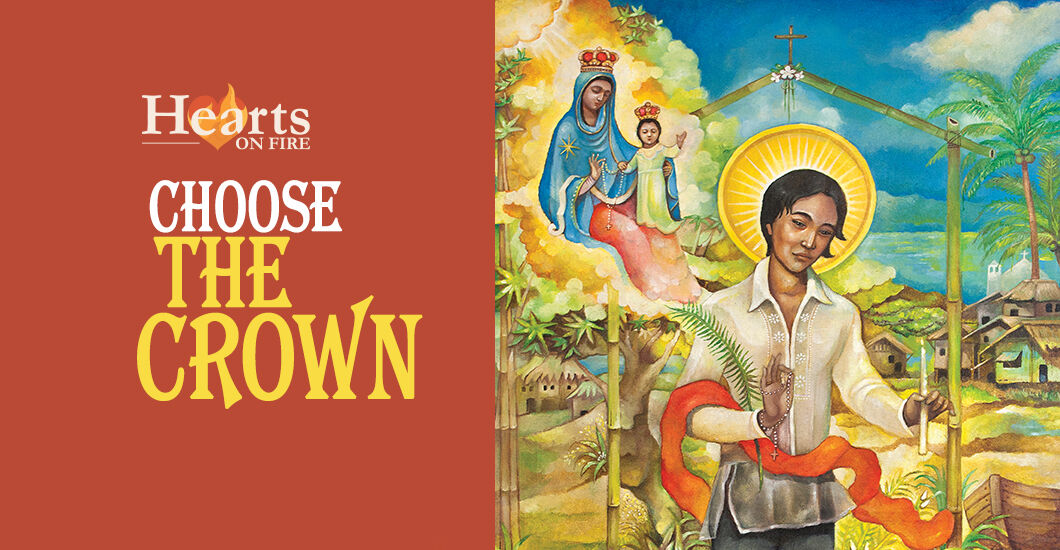
“I am a Catholic and I will die for God with a willing and ready heart. If I had a thousand lives, I would offer them all to Him.”
These were the dying words of a man who found himself in a situation where he could choose whether to live or die.
Lorenzo Ruiz, born in Manila in 1594. His Chinese father and Filipino mother were both Catholic. He grew up with a Dominican education, served as an altar boy and sacristan, and eventually became a professional calligrapher. A member of the Confraternity of the Most Holy Rosary, Lorenzo married and had two sons with his wife, Rosario.
In 1636, his life took a tragic turn. Falsely accused of murder, he sought the help of three Dominican priests who were about to undertake a missionary journey to Japan, despite the brutal persecution of Christians taking place there. Lorenzo had no idea until they had set sail that the group was heading to Japan and the danger that awaited there.
Fearing Spain would use religion to invade Japan as they believed they had done in the Philippines, Japan fiercely resisted Christianity. The missionaries were soon discovered, imprisoned, and subjected to many cruel tortures which included having huge quantities of water forced down their throats. Then soldiers took it in turns to stand on a board placed across their stomachs, forcing the water to surge violently from their mouths, nose, and eyes.
Finally, they were hung upside-down over a pit, their bodies tightly bound to slow circulation, prolong pain, and delay death. But one arm was always left free, so the victim could signal his intent to recant. Neither Lorenzo nor his companions recanted. In fact, his faith grew stronger as his persecutors interrogated him and threatened death. The holy martyrs hung over the pit for three days. By then, Lorenzo was dead and the three priests who were still living were beheaded.
A quick renunciation of their faith could have saved their lives. But instead, they chose to die wearing a martyr’s crown. May their heroism inspire us to live our faith with courage and without compromise.
'
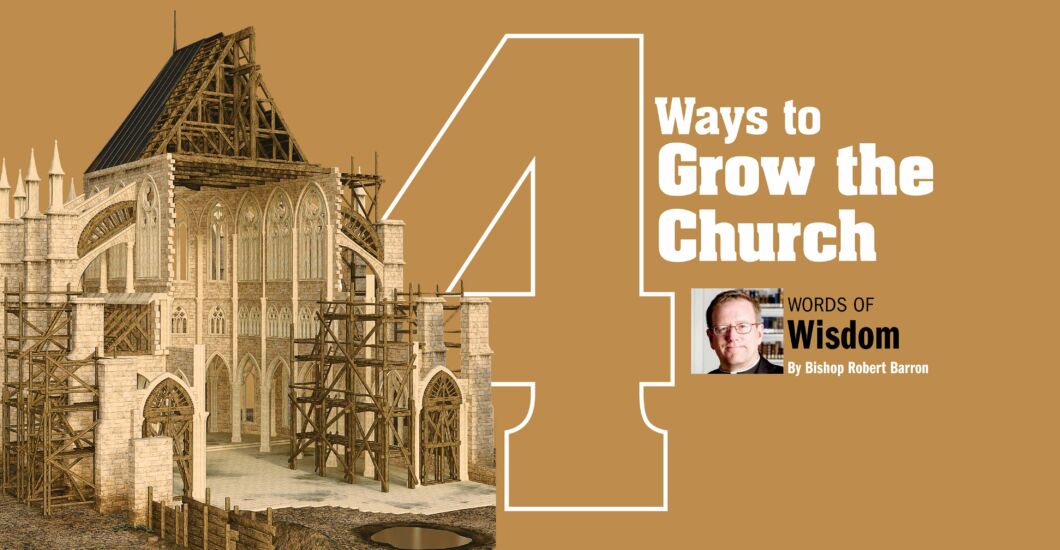
Last week, I met with the deans of our diocese to discuss a number of issues, the most prominent of which was the ongoing process of merging some of our parishes and reorganizing others into clusters. These moves, which have been happening over the past several years, are necessitated by a number of factors: the diminishing number of priests, demographic shifts in our cities and towns, economic pressures, etc. Even as I expressed my approval for some of these changes, I told the deans that, for every strategy of consolidation, I want a strategy for growth as well.
I simply refuse to accept the proposition that I, or any other bishop, should be presiding over the decline of our churches. By its very nature, Christianity is centrifugal, outward-tending, universal in purpose and scope. Jesus didn’t say, “Preach the Gospel to a handful of your friends,” or “Proclaim the Good News to your own culture.” Rather, he said to his disciples: “All authority in heaven and on earth has been given to me. Go therefore and make disciples of all nations, baptizing them in the name of the Father and of the Son and of the Holy Spirit” (Matthew 28:18–19). He also instructed his followers that the very gates of hell would not prevail against the fighting Church that he established. Therefore, maintaining things as they are, or managing decline, or treading water is absolutely not what Jesus wants or expects of us.
Permit me to say, right away, that the expansion of our Church is by no means the exclusive responsibility of bishops and priests. As Vatican II clearly teaches, every baptized Catholic is commissioned to be an evangelizer; so we’re all in this together. Therefore, what are some of the strategies of growth that can be employed by any Catholic? A first one I would highlight is simply this: every family that comes regularly to Mass should make it their evangelical responsibility to bring another family to Mass this coming year. Every faithful Mass-goer reading these words knows people who should be going to Mass and aren’t. They might be your own children or grandchildren. They might be coworkers who were once ardent Catholics and who simply drifted away from the practice of the faith, or perhaps people who are angry at the Church. Identify these wandering sheep and make it your evangelical challenge to bring them back to Mass. If we all did this successfully, we would double the size of our parishes in a year.
A second recommendation is to pray for the expansion of the Church. According to the Scriptures, nothing great is ever accomplished apart from prayer. So ask the Lord, insistently, fervently, even stubbornly, to bring back his scattered sheep. Just as we have to beg the harvest master to raise up workers to gather in his harvest, so we have to beg him to increase his sheepfold. I would encourage the elderly and the homebound in a parish to take on this specific task. And I might ask those who regularly do Eucharistic Adoration to spend fifteen or thirty minutes a day asking the Lord for this specific favor. Or I would suggest that liturgy planners include petitions for the growth of the parish in the prayers of the faithful at Sunday Mass.
A third enjoinder is to invite seekers to raise their questions. I know from lots of concrete experience over the past twenty years that many young people, even those who claim hostility to the faith, are actually deeply interested in religion. Like Herod listening to the preaching of John the Baptist in prison, even the seemingly anti-religious will go on religious websites and attend carefully to what is being discussed. So ask those who have disaffiliated why they no longer come to Mass. You might be surprised by how ready they are to tell you. But then, you have to have followed the recommendation of St. Peter: “Always be ready to give an explanation to anyone who asks you for a reason for your hope” (1 Pet. 3:15). In other words, if you elicit questions, you better be ready to give some answers. This means that you have to bone up on your theology, your apologetics, your Scripture, your philosophy, and your church history. If that sounds daunting, remember that in the last twenty-five years or so there has been an explosion of literature in just these areas, focusing precisely on the kinds of questions that young seekers tend to ask—and most of it is available readily online.
A fourth and final suggestion that I would make is simply this: be kind. Sherry Waddell, whose Forming Intentional Disciples has become a modern classic in the field of evangelization, says that a crucial first step in bringing someone to the faith is the establishment of trust. If someone thinks that you are a good and decent person, she is far more likely to listen to you speak about your faith. May I be blunt? Even the most casual glance at Catholic social media reveals a plethora of obnoxious behavior. Far, far too many seem intent upon trumpeting their own correctness, focusing on narrow issues that are unintelligible and irrelevant to most people, and tearing down their enemies. I fear that this reality on social media may be an amplification of attitudes in the Church outside of the digital space. These attitudes are inimical to evangelization. A colleague of mine has related that in his conversations with the alienated and unaffiliated that what keeps them away from the Church is their experience of what they describe as meanness from believers. So both online and in real life, be kind. No one will be interested in hearing about the faith life of obviously bitter and unhappy people.
So, we have our marching orders: proclaim the Lord Jesus Christ to all nations. Let us start with our own parishes, our own families. And let us never settle for maintenance of the status quo.
'
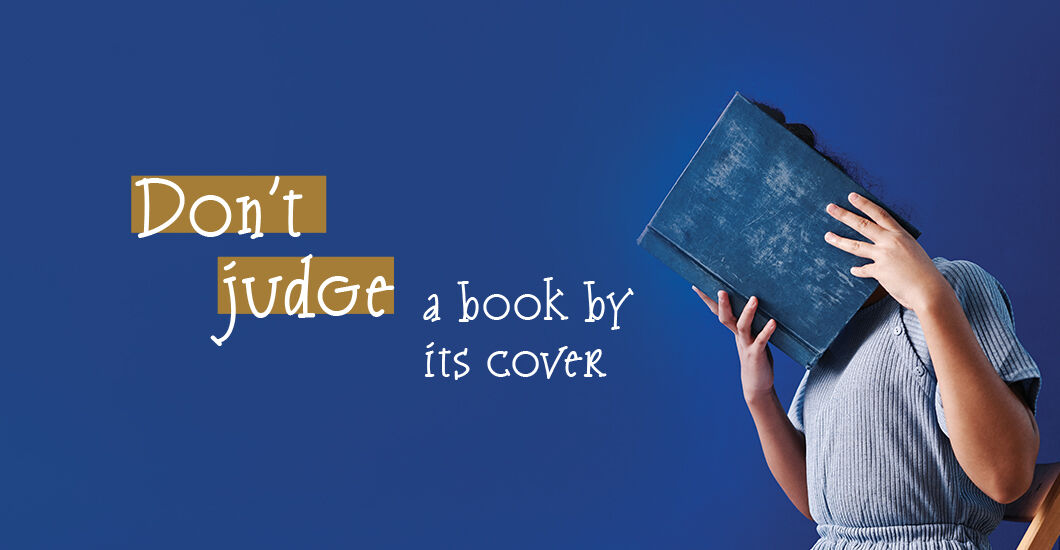
Let God write a beautiful story into your life
It was a beautiful summer day as we relaxed and chatted with friends while the children laughed and played in the creek. They proudly told us about their older son who had gone to Mexico to pursue his career in dentistry because it was much more affordable in their home country. Their son had told them about the new friends he was making. One of the girls he met astonished him by her behavior and attitude which didn’t quite match up with his conservative values, so he decided to step away from her. They were so proud of their son because he was able to perceive that it was not a good idea to pursue friendship or relationship with this girl. I could understand his caution, but I had a different perspective because I was once, ‘that girl’…
Growing Up
I was born in a small town in Quebec which was a great place to raise a family. Unfortunately, my parents divorced when I was only 2 years old, so I grew up with my mom and her partner, and only visited my dad once a fortnight. I always felt a lack of love and was not really introduced to Jesus. Although my parents were Catholics, and my mom made sure I received all my sacraments, she didn’t bring me to Sunday Mass, nor pray in the home, even the Rosary or Grace before meals. My faith was pretty basic. My father was Italian, but grew up in Canada. His mother was a devout Catholic and would never forget to pray every day. It’s a shame I didn’t follow in her footsteps…Yet God had other plans for me, I guess.
As I was growing up, I felt rejected by other kids because of my skin color. My mom is from Costa Rica so I wasn’t the typical French Canadian. However, I managed to make plenty of friends, although they weren’t all a good influence. As puberty hit, I developed into an attractive young lady who appeared much older than I was. I took advantage of this to become popular and had no problem getting boyfriends. My mom never really gave me the sexual education I needed and the environment I was living in was not a conservative one. As time went by, I suffered deception after deception. I felt empty. My “joy” was always temporary and soon enough, I ended up in someone else’s arms.
Search for Love
When I finished high school, I decided to take a year off and go to Costa Rica to live with my aunt before I started college. Since I already had a part-time job to buy my own fashionable clothes, make up, perfume etc, I saved money to fund the trip and learn Spanish in an academy. I arrived during the holiday season, so lots of festivities were taking place. Since my relationships with men were always ending badly, I had decided (at 18) that I was through with men. I resolved to spend time with family instead, but God, had other plans for me…
Five days after my arrival, my cousin took me to a restaurant-bar where he was meeting some friends. As soon as we sat down, a very handsome guy smiled at me. I blushed and smiled back. He asked if he could join us, and I accepted with pleasure. We both felt an immediate bond and arranged to meet again the next day, and the next, and the next and so on. Despite our cultural differences, we had so much in common and we were able to connect in a way we could not imagine. He told me, “What matters most to me is what’s in your head and what’s in your heart.” Nobody had ever said anything like that to me before.
William and I became inseparable. He even invited me to go to Mass with him before we went somewhere. Although I didn’t really pay attention, it still pleased me because I was with him. Then he invited me to go on a pilgrimage with his family to the basilica of Cartago that involved 4 hours of walking. Again, I didn’t really go because of my faith.
A Heart Poured Out
I was amazed to see thousands and thousands of people coming to the church, asking the Blessed Virgin Mary for a favor, or giving thanks for the favors they had received. It was incredible. Every one of them would enter the church, kneel down and walk on their knees all the way down the aisle until they reached the altar. When our turn came, I was feeling perfectly fine, but as soon as I knelt down, I felt like I was out of air. A big knot formed in my throat and I exploded in tears. I wept like a baby all the way to the altar. William looked at me, wondering what was happening, but didn’t say anything. Once we were outside again, his mom, Sandra asked me what had happened. “I don’t know,” I gasped. She said that Jesus had come to visit my heart. I knew she was right. It was like meeting someone you loved deeply after a long separation. Something supernatural, beyond my control, was taking over me.
From that moment on, I felt like a new person and my life was starting afresh. William took me to Confession for the first time since my Confirmation at 11 years old. My list was so long…I think the priest wanted to retire after hearing my confession. We have a lot of work to do he said!
William and I married 4 years later and God has blessed us with 3 beautiful boys. In 2016 we consecrated our family to the Immaculate Heart of Mary. My faith has continued to grow. I started serving the Church in various ministries: most recently as a catechist. God has truly spun my life in a different direction. He continues to polish my soul, crafting me into His masterpiece. Even the challenging times are part of His plan. When I embrace my cross and follow Him, He leads me towards His kingdom. Jesus chose me to serve as He did.
When I offer up little annoyances and humiliations in sacrifice to Him, He changes them into something more beautiful than I could ever imagine, as He has changed me.
As I reflected on what my friends had said, I thought of the old me, how lost I was, and how completely God transformed my life through the catalyst of meeting William. I advised them to encourage their son not to reject a friendship too hastily, but to let God’s light shine into their soul. Maybe God has a plan…
'
Overwhelmed by the uncertainties in life? Take heart. I was once there too—but Jesus showed me a way through
I was thirty-something, strolling through downtown in the dress I loved, an airy sky-blue print. Its shape flattered me I thought, so I wore it often. Without warning I suddenly glimpsed my reflection in a store window. Revolted, I tried to suck in my gut. It wouldn’t suck. It had nowhere to go. Bulges everywhere. Beneath the hem, my legs were hams. I loathed myself.
Carefree
My eating and weight were skyrocketing out of control; and beyond that, my entire life was a train wreck. Divorce had recently shredded my brief marriage. Externally I pretended everything was fine, but inside I was shattered.
Isolating behind walls of fat, I shared my anguish with no one. To numb my pain, I drank alcohol, worked, and ate—excessively. Successive dieting attempts only plummeted me into another cycle of obsession, self-pity, and compulsive binging.
And, beneath all that rubble, spiritual problems festered. I still called myself Catholic, but I lived like an atheist. To me, God was ‘up there’ all right, but far away and caring nothing about my miseries. Why should I trust Him in the slightest? I showed up at Sunday Mass only when visiting my parents, to deceive them into believing I practiced faithfully. In truth, I bulldozed through my days with no thought of God and went ahead doing whatever I pleased.
But the chilling memory of my reflection in that window haunted me. A new restlessness gripped my soul. Change was needed, but what? I had no idea. Nor did I have any idea that God Himself was moving in that moment, beginning to expose the ache in my heart with His gentle fingers.
Contending with Goliath
A woman at work expressed discouragement about her eating and weight, and we connected. One day she mentioned a twelve-step group she’d begun attending. The group asserted that because disordered eating is related to our emotional and spiritual lives, losing weight and keeping it off needs to address these components as well. This integrated approach appealed to me. Despite my scorn for groups, I tried some meetings. Soon hooked, I attended regularly, and though I rarely spoke up in the meetings, afterwards I would experiment with some of the ideas I heard. This approach worked somewhat, and after a few months I was elated when my weight began to drop. However—though I admitted this to no one—I was contending with a vicious Goliath, one which threatened to destroy my progress.
While at work each day, I followed a food plan that allowed me to eat moderately and to minimize temptations. But by 5:00 p.m. each day I was famished. I’d rush home and fly into a rampage, stuffing my face nonstop until I collapsed into bed. Powerless over this beast, and terrified that pounds would soon be piling on, I was disgusted with myself. What was I to do? I hadn’t a clue. The bleak pattern dragged on, and hopelessness gripped me.
An Idea Popped Up
Then unexpectedly the most outlandish thought popped into my head. Instead of going straight home from work, I could hit the 5:15 p.m. Mass. That would at least postpone my binge and reduce its duration by one hour. At first this idea seemed pathetic. Wasn’t it stop-gap and preposterous? But, with no other options in sight, desperation prompted me to try it. Soon I was attending Mass and receiving Holy Communion daily.
My one goal was to reduce my binging. Apparently, that was enough for Jesus. Truly present in His Body and Blood, He was waiting for me there, and glad to have me back. Only much later did I realize that He had an agenda in all this too: one unfathomably higher, wider, and deeper than my own. He knew precisely what I needed and how to provide it.
With tender care, he used my despair to draw my faltering feet onto solid ground and began what would be a lengthy process of healing my heart and connecting it with his own. At Mass each day, feeding me His very own Body and Blood, He began to remedy my ills, bathe me in supernatural graces, radiate light into my darkness, and equip me to combat evils that threatened me.
Freedom at Last
His Eucharistic graces ignited and invigorated me, and I upped my program participation to a new level. Earlier I had dabbled; now I jumped in with both feet, and as the days passed, I found two gifts which proved to be indispensable: a supportive community that stuck with me through good days and bad, and an arsenal of practical strategies. Without these, I would have lost heart and given up. But instead—over a long period, as I learned to let Jesus be for me the Savior He had died to be, as my twelve-step friendships enriched and strengthened me, and as I employed the tools and wisdom I was given, I found freedom from my disordered eating and a stable and lasting recovery plan which continues to this day.
In this process, faith that was once only in my head shifted to my heart, and my false image of a remote uncaring God crumbled to smithereens. Jesus, Blessed Savior who continues to draw me closer to Himself, turned so much of my bitter into sweet. To this day, as I cooperate, He continues to transform other pits and waste lands that prevent me from flourishing.
What about you? What impossible hurdles are you facing today?
Whether you are troubled about your eating, anguished about a loved one who has left the faith, or crushed by other burdens, take heart. Embrace Jesus in the Holy Eucharist and in adoration. He is waiting for you. Bring your ache, your bitterness, your messes to Him. He yearns to come to your aid just as He rescued me in all my distress. No problem is too great or too little to bring to Him.
'